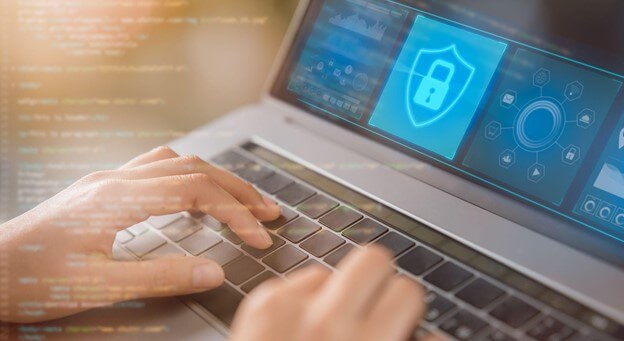
As the pandemic has contributed to many everyday changes, one major change stands out in particular; the way in which people have had to shift from working in an office setting, to performing their day-to-day job from home. Sure, in some cases this is a regular luxury but for others, this is completely unfamiliar territory that does come with some key adjustments to consider.
Today, we are going to touch on the need for continued online security measures, and safe computer habits, while working from the comfort of your home.
Why is this so important? Cybercrime continues to be an ongoing threat targeting both large corporations as well as even individuals. When you consider the amount of time you spend conducting business and financial matters online, it’s no secret that you can become vulnerable to cybercrime extremely easily, without the necessary precautions in place.
Taking steps to be safe online will help you in the long run, especially if you are now working from home and dealing with sensitive business or client matters.
Stay Safe Online With These Practical Security Tips:
Unique Password Protection is Vital
All your devices should require a password in order to be used. Ensure that your wireless and wired devices connected to your router, as well as your Wi-Fi network, are password protected.
The National Cyber Security Alliance recommends creating a strong, lengthy password for every online account you log in to on an employer-issued device. Try to choose a password that is at least 10 characters, and refrain from using personal details such as your birth information. Combining uppercase and lowercase letters with numbers and special characters is a great idea to ensure your password is hard to guess. Increased complexity reduces the chances of someone possibly hacking into your account.
While we’re on passwords, always do your best to have a unique password for each and every device you own. Using the same password across all devices is a recipe for disaster. Sure it makes your life easier and may seem more convenient not having to remember several combinations, but it leaves you highly susceptible to outside threats. Cyber criminals are constantly on the look out for this type of pattern as unfortunately continues to happen regularly, despite the risks.
Consider using a password manager if you think you’ll have difficulty remembering what password corresponds with each device. Password managers provide the perfect opportunity to create strong passwords without having to stress whether you’ll remember what you decided on.
Consider Two-Factor Authentication
Using two-factor authentication may not be a new concept in and of itself, but it serves to add another layer of security. The system confirms a user’s identity by requesting a username and password, as well as their phone number or an additional question. Your accounts are then more difficult for hackers to breach.
In an environment where hackers are seeking less tech-savvy users and those new to working from home, multi-factor authentication stops hacking in its tracks. With most employees working on unsecured home and public networks, adding multi-factor authentication as a safety net will relieve the IT department of some of the burden and make employees who are untrained in security less vulnerable to cybercrime.
Updates are Important and Shouldn’t be Ignored
If one of your devices alerts you that an update is available, be sure to install it as soon as possible. Your data is safeguarded by software updates (which include those for antivirus programs).
When you use your smartphone, it’s important to pay attention to any apps that need updating and for any updates to the operating software you use, especially if you use the same device for work and personal use.
Stay Away from Questionable Links and Websites
Email circulation can be quite high these days, and because of this, it’s not unusual to be bombarded with spammy emails in your inbox that are not from legitimate sources.
A phishing attempt is a cyber-attack that targets a recipient by tricking them into clicking a link or email. This ultimately causes the user’s computer to be infected. Links with insidious intentions use trickery in order to make users think they are getting something they want and need. According to the Federal Trade Commission, scammers send phishing emails that look like they are from organizations you trust, such as employers, in order to siphon off account numbers, passwords, and other sensitive information.
How can you protect yourself from such links? Always take a minute to inspect any suspicious links before clicking on them and confirm that it is actually from a trusted source. If you have any doubts or unsettling feelings, trust your gut and avoid the link or website altogether.
Secure Shredding Maintains Your Privacy and Confidentiality
Self-protection extends beyond online protection and begins with physically destroying your data. If you throw away banking statements, client files, and other confidential personal or business matters, you leave yourself open to dumpster divers who want to steal your information. Shredding all your confidential documents is the best way to protect yourself.
If you’re working from home right now, keep your confidential documents in a safe place to bring into the office to shred once your office opens again. Alternatively, contact Tri-State Shredding to ask about our residential shredding solutions. We provide secure on-site shredding services right at your doorstep!
